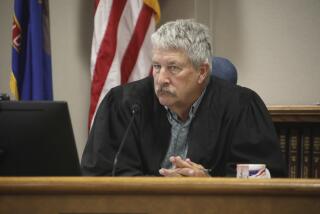South Dakota governor and fellow Republicans take aim at abortion pills

PIERRE, S.D. — Gov. Kristi Noem’s proposal to make South Dakota one of the hardest places in the country to get abortion pills gained support Tuesday from Republicans in the state House, even though a federal judge has halted a similar rule from taking effect there.
Every Republican on the South Dakota House‘s Health and Human Services committee voted to advance the bill for a vote in the full chamber this week. The bill would require women seeking an abortion to make three separate trips to a doctor in order to take abortion pills. Women in South Dakota can currently get both drugs in the two-dose regimen during a single visit and take the second dose at home.
Noem is not the only South Dakota politician taking aim at abortion pills. Her Republican primary challenger, state Rep. Steve Haugaard, is pushing a proposal to ban the administration of abortion drugs altogether. His bill passed the GOP-controlled state House on Tuesday and will next be considered in the state Senate.
But both proposals would face uphill battles in federal court.
A federal judge this month granted a preliminary injunction against a rule to restrict abortion pills that Noem initiated through in an executive order. Planned Parenthood, which operates the state’s only clinic that regularly provides abortion services, sued the state, arguing that the rule was an unconstitutional violation of abortion rights that would have made it practically impossible for the clinic to provide medicine-induced abortions.
U.S. District Judge Karen Schreier, who was appointed under former President Bill Clinton, wrote in her order that the rule “likely imposes an undue burden on Planned Parenthood and its patients’ right to seek an abortion.” Noem has appealed Schreier’s order to a higher court.
The governor’s office acknowledged that most of her current proposal is tied up in federal court; a clause in the bill stipulates that most of it wouldn’t take effect until the court battle is resolved.
The Supreme Court’s willingness to consider striking down Roe vs. Wade — the landmark 1973 decision that established the nationwide right to an abortion — has prompted a flurry of legislation in statehouses this year.
Noem has argued that she proposed the bill out of concern for women’s safety.
“In the instance of telemedicine abortions, someone can make a phone call, get online, order the drugs to be sent to their home, and there is no medical supervision,” she said at a news conference this month.
Last year, after a scientific review supported broadening access to the pills, the U.S. Food and Drug Administration lifted a requirement that those seeking abortions pick up the drugs in person.
The agency found complications from the medication to be rare. About 40% of abortions in the U.S. are done through medication rather than surgery, and the FDA has reported only 26 deaths associated with the drug since 2000 — though not all of those can be directly attributed to the medication due to the patients’ existing health conditions and other factors.
“For South Dakota to put these barriers in front of women says that they believe they are smarter than the FDA,” Sarah Stoesz, president of Planned Parenthood North Central States, told the Associated Press this month.
Rep. Haugaard, Noem’s primary rival, has also pushed the House to put a proposed constitutional amendment on the November ballot that would define a fertilized egg as a living human being. That proposal was defeated by a one-vote margin in the GOP-controlled House on Tuesday after fellow Republicans said it would add a potentially unwieldy definition to the state constitution.
“Roe versus Wade is on the ropes and hopefully on its way out,” Haugaard said.
Stoesz questioned why Republican lawmakers are aggressively attacking abortion rights when the U.S. Supreme Court could potentially strike down Roe in a ruling this year. South Dakota is one of a dozen states where laws banning abortions will be triggered if the justices overturn Roe.
“What the Legislature is doing right now just strikes me as purely political posturing,” Stoesz said. “But at the end of the day, real people’s lives are affected.”
More to Read
Sign up for Essential California
The most important California stories and recommendations in your inbox every morning.
You may occasionally receive promotional content from the Los Angeles Times.










